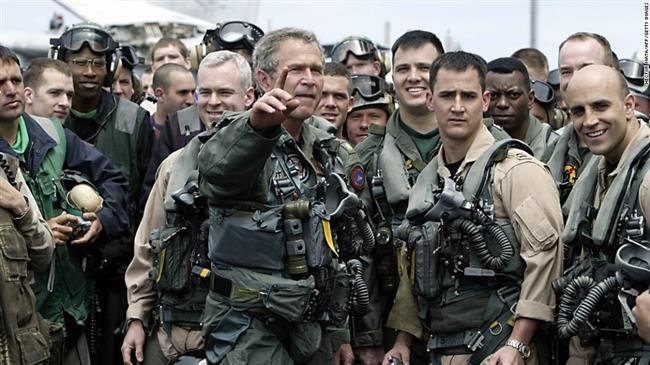US has spent six trillion dollars on wars that killed 500,000 people since 9/11: Study

The "Costs of War" study was conducted by Brown University's Watson Institute
for International and Public Affairs. It was published on Wednesday. A brief
summary of this study was released last week.
The report takes stock of the US military spending and its Overseas Contingency
Operations account, as well as "war-related spending by the Department of State,
past and obligated spending for war veterans’ care, interest on the debt
incurred to pay for the wars, and the prevention of and response to terrorism by
the Department of Homeland Security."
"The United States has appropriated and is obligated to spend an estimated $5.9
trillion (in current dollars) on the war on terror through Fiscal Year 2019,
including direct war and war-related spending and obligations for future
spending on post 9/11 war veterans,” the study said.
"In sum, high costs in war and war-related spending pose a national security
concern because they are unsustainable," the report concluded. "The public would
be better served by increased transparency and by the development of a
comprehensive strategy to end the wars and deal with other urgent national
security priorities."
The United States -- under Republican George W. Bush’s presidency – launched the
war on terror by invading Afghanistan on October 7, 2001 following the September
11, 2001 terrorist attacks which killed nearly 3,000 people in New York.
US officials assert that the attacks were carried out by 19 al-Qaeda terrorists
but many experts have raised questions about the official account. They believe
that rogue elements within the US government, such as former Vice President Dick
Cheney, orchestrated the 9/11 attacks in order to accelerate the US war machine
and advance the Zionist agenda.
Following the 9/11 attacks, the US and its allies invaded and occupied
Afghanistan, and Washington also started intermittent drone strikes inside
neighboring Pakistan. In early 2003, the US invaded Iraq under the pretext that
the regime of Saddam Hussein possessed weapons of mass destruction. No such
weapons, however, were ever found in Iraq.
The "Costs of War" study found that the "US military is conducting
counter-terror activities in 76 countries, or about 39 percent of the world's
nations, vastly expanding [its mission] across the globe." In addition, these
operations "have been accompanied by violations of human rights and civil
liberties, in the US and abroad."

According to researchers, America’s so-called war on terrorism has killed up to
507,000 people in Iraq, Afghanistan and Pakistan.
They estimated that "between 480,000 and 507,000 people have been killed in the
United States’ post-9/11 wars in Iraq, Afghanistan, and Pakistan." This toll
"does not include the more than 500,000 deaths from the war in Syria, raging
since 2011" when US-sponsored militants started terrorist activities against the
Syrian government.
The study acknowledged that the actual death toll is likely higher.
The death toll in Afghanistan, as of October 2018, stood at about 147,000
people, including Afghan security forces, civilians and Taliban fighters. The
figure also included the 6,334 American fatalities.
The war on terrorism also left 65,000 people dead in Pakistan, including 90
American contractors, nearly 9,000 local security personnel and more than 23,000
civilians. The rest of the casualties were militants, according to the report.
From 268,000 to 295,000 people died in Iraq following the US-led invasion and
occupation, the study said.
Source:PressTV
















